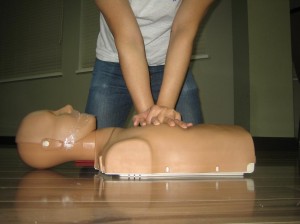Studying CPR has become one of the most popular healthcare-related training in the US today. With disasters happening left and right, it pays to be a trained CPR rescuer, since your skills in giving CPR can potentially save someone’s life. There are numerous CPR programs to sign up for, mainly basic or advanced life support (BLS/ALS). These two categories have different programs under them, with accompanying re-certification classes. Re-certification is available to rescuers with certificates that are nearing expiry (not expired certificates).
Training credentials for CPR

All of the programs at our providers are certification classes, meaning once a trainee completes the class and passes the post-test, he or she is given a CPR training credential for that program. Post-tests are usually a skills test and a written exam, except for the general public program (for basic CPR). The GP program is an optional certification program where the post-test is just a skills test.
Credentials are valid for two years. Before they expire, the rescuer can renew them at a re-certification program. If the credentials expire, the rescuer has to take the training program again to get a new certificate.
Re-certification is available for the following programs:
- Basic Life Support for HCPs (four hours)
- Advanced Cardiac Life Support (five to six hours)
- Pediatric Advanced Life Support (six to eight hours)
Programs for CPR
There are three programs under Basic Life Support (BLS) and two under Advanced Life Support (ALS). Basic Life Support programs can be taken by the general public and HCPs (healthcare providers), while ALS programs are only available to HCPs.
- Basic CPR and AED – BLS, general public, 4 hours; one-person CPR plus first aid and AED training
- Basic CPR and AED (C) – BLS, HCPs, 4.5 hours; one-person CPR plus first aid and AED training
- Basic Life Support for HCPs – BLS, 4.5 hours; one and two-person CPR, 2010 BLS guidelines, first aid and AED training
- Advanced Cardiac Life Support – ALS, 16 hours over 2 days; medical management of cardiac arrest (adult victims)
- Pediatric Advanced Life Support – ALS, 14 hours over 2 days; medical management of cardiac arrest (pediatric victims)
Note: Pediatric refers to patients/victims younger than 18 years old. However, the difference in terms of management is greatly varied only at very young ages (infancy to school age). For older teenagers, medical management is similar to adults’.
Basic vs. Advanced Life Support
Basic Life Support courses are very short because they only focus on skill building and stabilizing a victim of cardiac arrest. Cardiac arrest happens when the heart muscle doesn’t work and the heart cannot pump blood to the body. Basics are taught in the BLS program – chest compressions, rescue breaths, and defibrillation with an AED. A few first aid skills such as bandaging, the Heimlich maneuver, and splinting.
Advanced Life Support courses teach students how to manage a stable victim or to move from stabilizing to medically managing the victim. ALS includes diagnostics, use of equipment, and medication administration. The most important diagnostic procedure included in ALS training in ECG – echocardiograms. Trainees are taught how to read ECG tracings.
